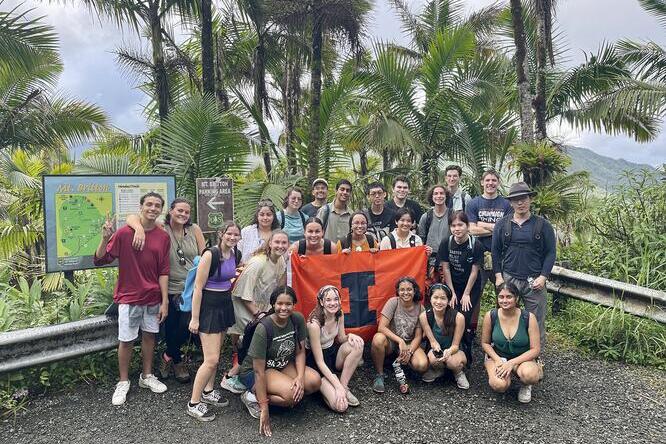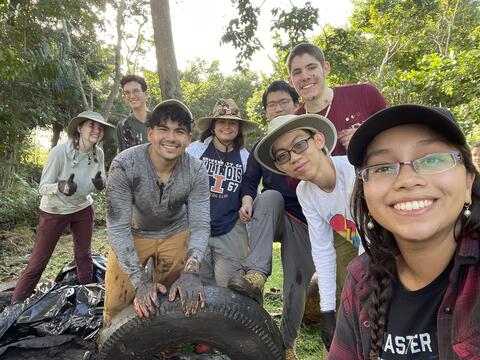Puerto Rico case study sheds light on academic-NGO collaborations

Puerto Rico has faced several human-made and natural crises in recent years, including the devastating effects of Hurricane Maria in 2017. Building disaster resilience and recovery is crucial for community well-being and requires a comprehensive approach with cooperation from multiple organizations. A new study from the University of Illinois Urbana-Champaign examines the partnership between a Puerto Rican non-governmental organization (NGO) and a group of academics.
“Disaster resilience is a grand-scale challenge that is complex and multifaceted. When individuals from different disciplines and cultural perspectives come together, there is genuine value in approaching the problem from as many of those perspectives as possible. In this study, we sought to identify the complexities, risks, and pitfalls of NGO-academic cooperation in order to lay out a process that is more efficient and successful for future practitioners,” said Luis F. Rodríguez, associate professor in the Department of Agricultural and Biological Engineering (ABE), part of the College of Agricultural, Consumer and Environmental Sciences (ACES) and The Grainger College of Engineering, and associate director of the Institute for Sustainability, Energy, and Environment at U. of I.
Rodríguez is a co-author of the study, which documents the collaboration between a National Science Foundation INFEWS-ER (Innovations at the Nexus of Food, Energy, and Water Systems Educational Resources) project and Caras con Causa (CCC), a Puerto Rican NGO that works with disadvantaged communities to create educational, environmental, and economic opportunities for local youth.
Rodríguez led the INFEWS-ER project, which involved a cohort of graduate students, mentors, and advisors from universities across the U.S. The group was tasked with developing a literature database and a list of funding opportunities to support fundraising for CCC’s programs.
Project participants met regularly on Zoom from Oct. 2020 to April 2021. Daniela Markazi, a doctoral student in informatics at the U. of I., lead author of the study, and 2023 Graduate Student Leadership Award Winner, analyzed notes from the meetings to identify main themes and challenges.
Eight themes emerged from the discussions — team organization, collaboration, deliverables, team contributions, context understanding, outcomes, technology setup, and lessons learned.
These themes didn't occur all at the same time; their importance shifted over the course of the project. For instance, the context of Puerto Rico and understanding of CCC were discussed a lot in the beginning, while project deliverables became a focus later in the process, Markazi explained.
“Puerto Rico is such a unique space, both in terms of natural disasters and the environment, politics, and socio-economic conditions. Overall, we learned that having a structured approach to doing transdisciplinary research is helpful because this kind of work is very hard to do. At a broader level, cultural understanding and awareness is extremely important for the academic-NGO relationship,” she noted.
The researchers also emphasize the importance of cultivating trust between academics and NGO partners.
“It takes a long time to build trust, and constant maintenance is required once you have it. With trust, you’ll create an environment where open and frank conversations can happen among the collaborators on both sides, even if disagreements or corrections need to occur,” Rodríguez stated. “We are working to incorporate trust building into all levels of our instruction, which starts from first-year students, and our learning objectives are very strongly built around engaging with stakeholders.”
Rodríguez, who is a native of Puerto Rico, began working with CCC in 2018 after Hurricane Maria. He leads Research Experiences for Undergraduates (REU) projects for students to learn engineering skills related to Puerto Rico’s food, energy, and water systems, and he developed a disaster relief and resilience course for ABE undergraduate students that includes a study trip to Puerto Rico. These efforts are supported by a grant from the USDA’s National Institute of Food and Agriculture (NIFA).
“I believe we have identified key skills that students ought to be picking up in order to best engage in these types of projects, allowing us to design a useful experience for even young students, and I'm optimistic that we can continue to catalyze what we're doing into the future,” he stated.
Markazi, who holds two undergraduate degrees from ABE, took Rodríguez’s class in 2018, and it shaped her education and future goals.
“The experience was pivotal for my career. As an undergraduate student in ABE, I was heavily involved in robotics and software engineering. But as soon as I had the opportunity to go to Puerto Rico and work on these resilience-related projects, that changed my career and what I wanted to do. I took the class three times, and when I started my doctorate, I was able to get more involved in our work and eventually help teach the classes and lead the REU program, too,” she stated.
The undergraduate projects serve as a precursor to the graduate research experience, where students learn to work in transdisciplinary environments, Rodriguez noted.
Ultimately, the academic-NGO collaboration benefitted both partners. The graduate students gained experience in crisis management for vulnerable communities, while CCC obtained a comprehensive database of scholarly research to support their projects and fundraising efforts, Rodríguez and Markazi concluded.

The article, “Transdisciplinary academic-NGO collaborations for the resilience of food, energy, and water: a case study on the INFEWS-ER experience in post-disaster Puerto Rico,” is published in Frontiers in Environmental Science [DOI 10.3389/fenvs.2023.1108375]. Authors include Daniela M. Markazi, Ann M. Brunton, Philip Margarit, Glorynel Ojeda-Matos, Sinta Sulistyo, Michael Fernández Frey, Mariela Ramírez Berríos, Samuel P. Reed, Jill Heemstra and Luis F. Rodríguez.
The INFEWS-ER cohort was funded under National Science Foundation grants 1639340 and 1833225 and under National Institute for Food and Agriculture Project Number ILLU- 741-624.